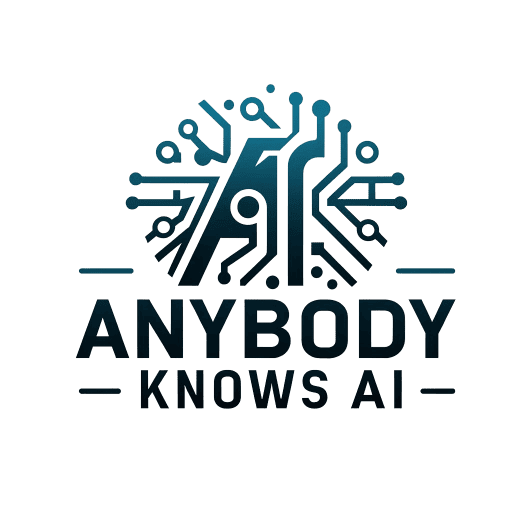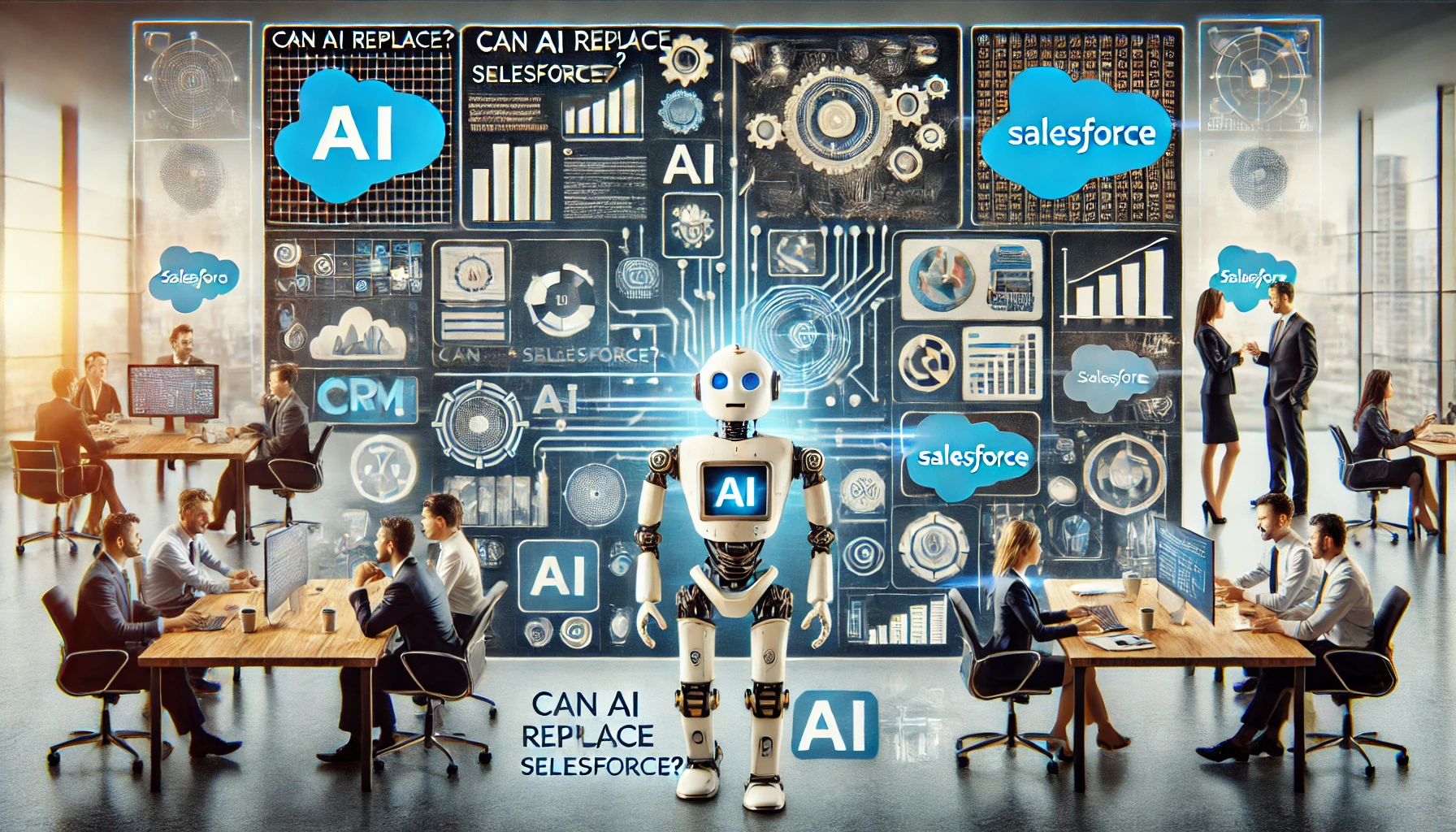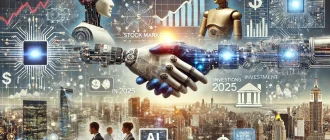Can AI replace humans in Salesforce? The short answer is no, but AI can significantly enhance Salesforce’s capabilities. While AI can automate repetitive tasks and provide predictive insights, it still can’t match the flexibility and creativity of human developers in managing enterprise software apps like Salesforce. In this article, we’ll delve into AI’s role in the Salesforce ecosystem, its limitations, and how AI complements the skills of Salesforce professionals to drive business success.
Key Takeaways
- AI significantly enhances the Salesforce ecosystem by improving customer engagement and streamlining operations, exemplified by tools like ‘Sales GPT’ and Einstein AI.
- Despite AI advancements, Salesforce developers remain essential for their unique skills in customization, problem-solving, and complex decision-making that AI cannot replicate.
- AI is a complementary tool for Salesforce developers, increasing productivity and efficiency through automation, enabling them to focus on higher-value tasks and innovative solutions.
| Aspect | Current State | AI Potential | Impact | Challenges |
|---|---|---|---|---|
| Automation of Tasks | Salesforce automates basic tasks (data entry, emails). | AI can enhance automation with predictive analytics. | Increased efficiency and reduced manual workload. | AI needs quality data to make accurate predictions. |
| Sales Forecasting | Uses historical data for forecasting. | AI can use machine learning for more accurate forecasts. | She improved her forecasting accuracy. | High dependency on accurate and current data. |
| Customer Insights | Provides standard analytics and reporting. | AI can generate deeper insights and trends. | Better understanding of customer behavior. | Requires integration of diverse data sources. |
| Lead Scoring & Prioritization | Salesforce scores lead based on predefined criteria. | AI can dynamically score leads based on behavior patterns. | Optimized lead management and conversion. | Risk of over-reliance on AI models without human input. |
| Personalized Marketing | Salesforce offers basic personalization. | AI can hyper-personalize marketing messages in real time. | Enhanced customer engagement and satisfaction. | Privacy concerns and data compliance issues. |
| Support & Customer Service | Uses bots for basic support tasks. | AI can provide advanced support with natural language processing. | Reduced response times and improved customer service. | Complex queries may still require human intervention. |
| Data Management | Relies on manual data entry and maintenance. | AI can automate data cleaning and management processes. | Improved data accuracy and quality. | Initial setup and training of AI models can be time-consuming. |
| Decision Making | Data-driven but requires human interpretation. | AI can offer actionable insights and recommendations. | Faster decision-making processes. | AI biases and model limitations. |
| Adoption & User Training | Salesforce requires user training and adaptation. | AI can simplify interfaces and reduce training needs. | Lower training costs and faster onboarding. | Resistance to change and adaptation to new tech. |
| Overall CRM Management | Comprehensive CRM solution with extensive features. | AI can complement but not fully replace Salesforce. | Enhanced CRM capabilities and innovation. | Full replacement is unlikely due to complexity and integration needs. |
Introduction to AI and Salesforce
Artificial intelligence (AI) is transforming how businesses operate, and Salesforce is one company at the forefront of this revolution. By integrating AI-powered tools and technologies, Salesforce enhances customer experiences, improves operational efficiency, and drives business growth. AI’s ability to analyze vast amounts of data and provide actionable insights is a game-changer for businesses looking to stay competitive.
Salesforce’s AI capabilities, such as Einstein AI, help businesses better understand customer needs, predict future trends, and automate routine tasks. This saves time and allows companies to focus on strategic initiatives that drive growth. As AI continues to evolve, its integration with Salesforce will become even more seamless, offering new opportunities for innovation and efficiency.
Understanding AI’s Role in the Salesforce Enterprise Software Apps Ecosystem

The future of business is increasingly centered around enhancing the customer experience, with technology playing a pivotal role. AI is revolutionizing companies in the Salesforce ecosystem by improving customer engagement and streamlining company operations. Companies utilizing Salesforce’s ‘Sales GPT’ technology have seen significant improvements in identifying and engaging potential customers more effectively.
Strategic integration of AI into Salesforce, led by Einstein AI, marks a significant advancement. By processing billions of predictions daily, Einstein AI offers users crucial insights to maintain a competitive edge. This AI model combines various functionalities to tailor content and actions based on user needs, making Salesforce applications more intuitive and powerful.
Additionally, AI technologies like conversational AI can understand natural language commands, allowing users to understand natural language commands and interact with Salesforce applications more intuitively.
Salesforce’s collaboration with IBM’s Watson has boosted AI capabilities, enabling advanced data analysis and deeper customer insights. These integrations demonstrate that AI is a core component of the Salesforce ecosystem, enhancing personalized and effective customer interactions.
Navigating the AI Landscape
The AI landscape is rapidly evolving, with new technologies and innovations in artificial intelligence emerging every day. For businesses to stay ahead, navigating this landscape effectively is crucial. This involves identifying opportunities and challenges, understanding the role of AI in software development, and developing a strategic roadmap for AI adoption.
Key trends in AI, such as machine learning and natural language processing, are reshaping the enterprise software app industry. Businesses must stay informed about these trends and understand how they can be leveraged to gain a competitive advantage. Developing a clear AI strategy involves conducting a thorough audit of current operations, identifying areas where AI can add value, and ensuring the necessary infrastructure and skills are in place.
Can AI Fully Replace Salesforce Developers?
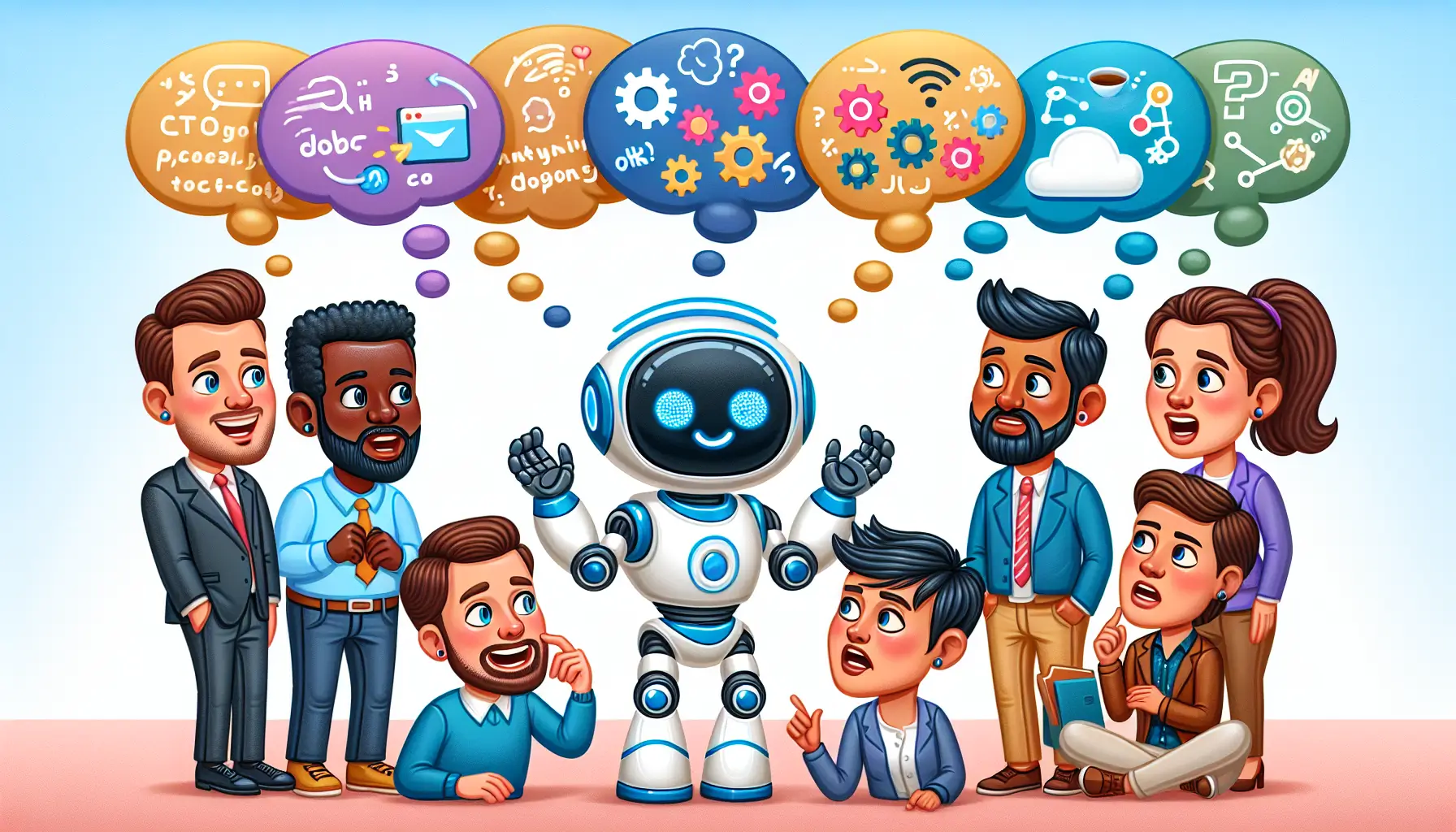
Despite AI’s advances in automating tasks and offering insights, it cannot replicate the unique skills and expertise of Salesforce developers. These professionals possess technical skills, business acumen, and problem-solving abilities essential for creating tailored solutions.
Their deep understanding of programming languages and business processes enables them to develop applications that meet specific business requirements and needs.
AI is excellent at managing repetitive tasks and predefined patterns but lacks the flexibility needed for complex decision-making and problem-solving. With their critical thinking and creativity, Salesforce developers can tackle intricate challenges that AI cannot address. This adaptability is crucial in dynamic business environments where customization and optimization are key.
Even with AI’s advancements, Salesforce developers remain indispensable. Their ability to customize applications, integrate with external systems, and solve complex problems ensures they continue to play a vital role in the Salesforce ecosystem. Thus, AI fully replacing Salesforce developers is a distant possibility.
The Limitations of AI in Salesforce Software Development
AI has its limitations, particularly in the realm of Salesforce development. One significant challenge is processing unstructured data effectively, which limits AI’s usability in diverse applications. On the other hand, Salesforce developers have a deep understanding of both the platform and programming, allowing them to navigate these complexities easily.
Moreover, while AI can help reduce some costs, businesses still face significant software license fees when using traditional enterprise applications.
Creative problem-solving, complex decision-making, and emotional intelligence are skills that AI cannot yet master. These human attributes are crucial for developing innovative solutions and addressing unique business challenges. AI’s inability to perform non-linear problem-solving further emphasizes the need for skilled human developers with strong problem-solving skills.
These limitations highlight the ongoing need for Salesforce developers in the development process. While AI can assist with certain aspects of Salesforce development, it lacks the depth and flexibility human expertise brings.
AI and Traditional Enterprise Apps
Traditional enterprise apps have been the backbone of business operations for decades, but AI is changing the game. AI-powered apps can manage corporate data more efficiently, automate processes, and provide insights that traditional apps cannot. This transformation is leading to improved operational efficiency and higher customer satisfaction.
Adopting AI-powered apps comes with its own set of benefits and challenges. On the one hand, these apps can quickly build customized apps tailored to specific business needs, reducing the time and cost associated with software development.
On the other hand, integrating AI technologies into existing systems can be complex and require significant business process changes. However, the potential for enhanced performance and customer satisfaction makes this transition worthwhile.
The Complementary Role of AI and Salesforce Developers
Rather than replacing Salesforce developers, AI is a complementary tool that enhances their productivity and efficiency. Salesforce’s integration of artificial intelligence allows businesses to improve customer interactions and automate responses through AI algorithms. This synergy enables developers to focus on higher-value activities while AI handles repetitive tasks.
While AI can primarily save money by automating repetitive tasks, its true value enables developers to focus on higher-value activities.
Generative AI can significantly speed up the customization process of Salesforce customized apps, allowing developers to build and write software code more efficiently and quickly. Tools like Einstein for Developers provide real-time coding suggestions, further enhancing productivity and reducing errors. AI-driven tools also help identify bugs and security vulnerabilities early in the coding process, ensuring robust applications.
Embracing AI allows Salesforce developers to leverage these traditional enterprise apps, enhancing their business value. They can innovate and tackle complex tasks requiring human creativity and critical thinking, increasing their overall value to organizations.
Case Studies: AI Enhancing Salesforce Development

Real-world examples illustrate how AI enhances Salesforce development, providing practical insights into its benefits. For the latest example, developers using AI-powered code generation tools have significantly shortened development time and improved code quality. By automating mundane coding tasks, these tools enable developers to concentrate on more strategic project aspects.
AI algorithms also play a crucial role in analyzing large datasets and extracting valuable client insights. This capability is particularly beneficial in fields like data science, where understanding patterns and trends can drive better business decisions.
Case studies of companies successfully integrating AI into their Salesforce development processes show tangible benefits like increased customer satisfaction and more efficient operations for Salesforce developers. These examples show that AI can enhance Salesforce developers’ capabilities when properly applied, leading to innovative solutions and better business outcomes.
Essential Problem-Solving Skills for Salesforce Developers in an AI-Driven World
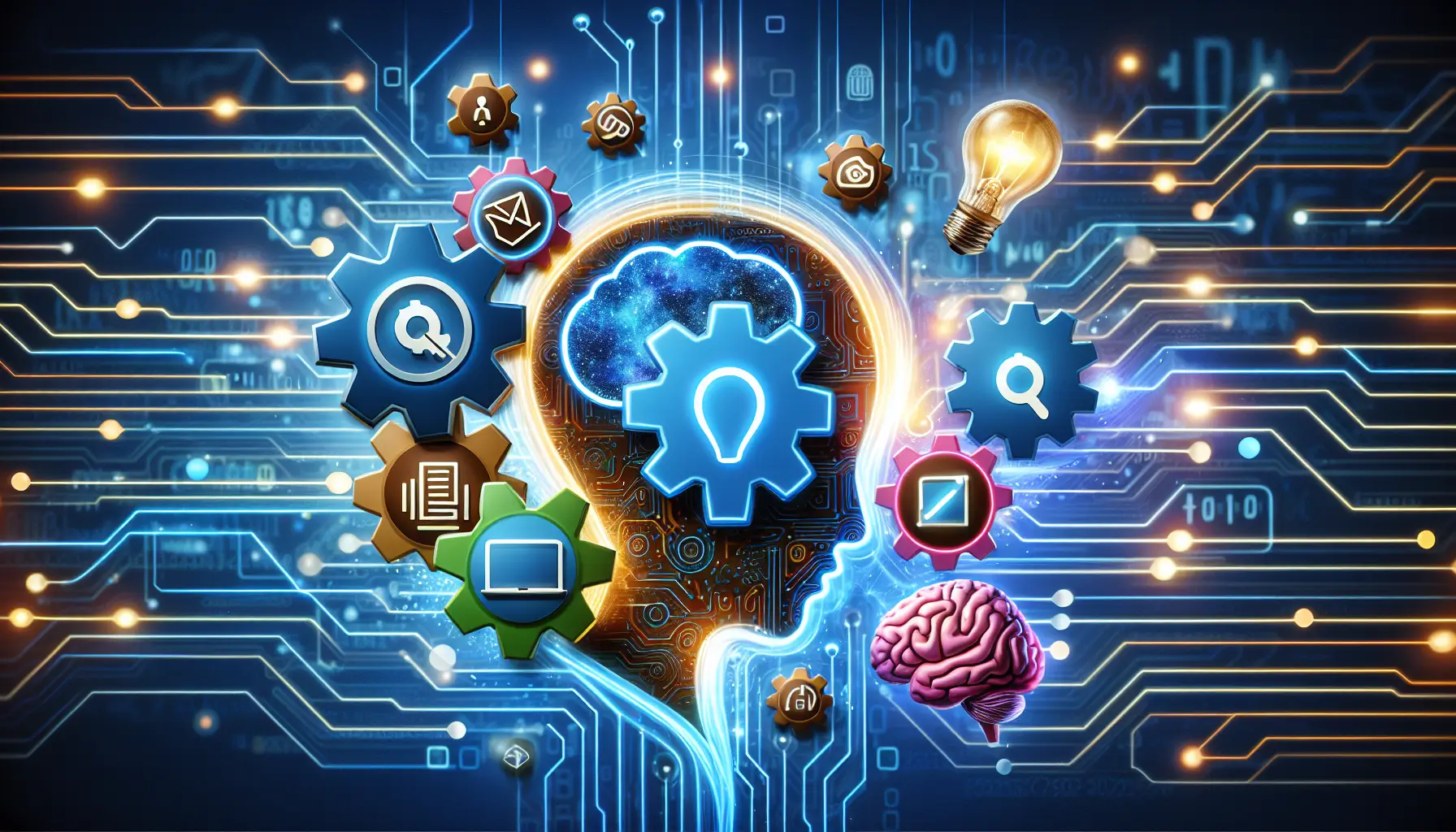
As AI becomes more integrated into the Salesforce ecosystem, software development developers must adapt by acquiring new skills and continuously improving their expertise. Ongoing professional development and networking are essential for remaining competitive in this evolving landscape. Salesforce developers must master Apex and Lightning Web Components to create effective, scalable solutions.
Effective data governance and security, crucial in an AI-driven environment, depend on proficiency in data management. Effective communication skills are also necessary for interacting with stakeholders and clearly articulating business requirements and technical concepts.
Staying informed about emerging technologies like AI and IoT is vital for Salesforce developers to drive innovative solutions. Resources from companies like Salesforce Trailhead offer valuable online courses to help developers enhance their skill sets and stay ahead of industry trends.
Problem-Solving Skills for Salesforce Admins
Salesforce admins play a critical role in managing and optimizing Salesforce implementations, but AI is changing the skillset required for this role. To stay ahead, Salesforce admins must develop problem-solving skills that complement AI, including critical thinking, creativity, and analytical skills.
Staying up-to-date with industry trends is essential for Salesforce admins to remain competitive. This involves continuous learning and professional development, leveraging resources like Salesforce Trailhead to enhance their skill set. Additionally, understanding how to use AI-powered tools effectively can help admins manage corporate data more efficiently and focus on strategic tasks that drive business growth.
Writing Software Code in the AI Era
Writing software code is a critical skill for developers, but AI is changing how code is written and maintained. AI-powered tools can generate code, automate testing, and optimize performance, freeing developers to keep writing code and focus on higher-value tasks. This shift is transforming the software development process, making it more efficient and less error-prone.
The benefits of using AI-powered tools in software development are significant. Developers can quickly build customized apps, write software code more efficiently, and ensure higher code quality. However, there are challenges, such as staying updated with the latest AI technologies and understanding how to integrate these tools into existing workflows. By embracing AI, developers can enhance productivity and contribute to more innovative and robust software solutions.
How Salesforce Admins Can Leverage AI Tools
Leveraging AI tools can greatly enhance efficiency and customer interactions for Salesforce admins. For instance, Marketing GPT by Salesforce employs AI to craft personalized marketing strategies, boosting customer engagement. Einstein’s recommendation features enable agents to access relevant knowledge articles rapidly, speeding up case resolution.
The predictive capabilities of Einstein improve over time as it learns from more customer data interactions, leading to more accurate predictions and better customer service. AI-driven automation lightens the workload on customer service agents by managing routine inquiries with virtual assistants and bots.
AI tools like Einstein Copilot aid sales representatives by offering relevant insights for client meetings, ensuring they are well-prepared to provide tailored solutions. These tools allow Salesforce admins to manage corporate data more efficiently and concentrate on strategic tasks that drive business growth.
Developing a Strategic AI Implementation Plan
Developing a strategic AI implementation plan requires several key steps for successful integration and maximum value. Conducting a thorough audit of current operations can identify processes that would benefit from AI integration. This helps pinpoint areas where AI can have the most significant impact.
Involving employees in the AI transformation process helps alleviate concerns about job security and ensures a smooth transition. A robust data environment is crucial for AI projects, ensuring data is well-integrated and not siloed. This foundation allows for effective real-time data analysis, helping businesses generate insights and make informed decisions.
Implementing generative AI across various departments can transform business workflows and decision-making processes, making them more efficient and data-driven. Following these steps enables businesses to create a robust AI implementation plan that drives strategic decisions and enhances overall performance.
Future Trends in Integrating AI Technologies and Salesforce Integration

AI and Salesforce integration’s future promises exciting advancements and new opportunities. As AI evolves, its integration with Salesforce will become more seamless, driving the digital transformation of the enterprise software app industry. Businesses must stay ahead by integrating AI technologies and continuously learning about new technologies.
Industry trends show a growing focus on data science and machine learning, which is crucial for future Salesforce applications. Effectively analyzing and leveraging data will become increasingly important, making artificial intelligence and data-driven decision-making a standard practice in the Salesforce ecosystem.
Looking ahead, businesses can be assured that AI will continue to enhance their capabilities, offering valuable insights and automating routine tasks. Staying informed about technological advancements and industry trends allows companies to future-proof operations and remain competitive in a rapidly changing landscape.
Summary
In conclusion, while AI has made significant advancements in the Salesforce ecosystem, it cannot fully replace the unique skills and expertise of Salesforce developers. The complementary role of AI and developers enhances productivity and drives innovation, leading to more efficient and effective business solutions.
By embracing AI and continuously developing their skills, Salesforce developers and admins can leverage these powerful tools to improve customer interactions, streamline operations, and stay ahead of industry trends. The future of AI and Salesforce integration holds great promise, and businesses that strategically implement AI will reap the benefits of a more dynamic and data-driven environment.
Frequently Asked Questions
Can AI replace Salesforce developers entirely?
AI cannot fully replace Salesforce developers, as their unique critical thinking, creativity, and complex systems and problem-solving skills are beyond AI’s capabilities. Developers will continue to play an essential role in leveraging technology effectively.
How can AI enhance Salesforce development?
AI enhances Salesforce development by automating repetitive tasks and offering real-time coding suggestions, enabling developers to concentrate on more strategic initiatives and foster innovation.
What are the limitations of AI in Salesforce development?
AI in Salesforce development has limitations in processing unstructured data, lacks creative problem-solving capabilities, and struggles with complex decision-making tasks. Therefore, human developers are essential to address these challenges effectively.
What skills are essential for Salesforce developers in an AI-driven world?
In an AI-driven world, Salesforce developers must focus on continuous learning, data management proficiency, and effective communication skills to stay competitive and adapt to emerging technologies. These skills are crucial for successfully navigating the evolving landscape.
How can Salesforce admins leverage AI tools?
Salesforce admins can leverage AI tools such as Marketing GPT and Einstein Copilot to enhance personalized marketing strategies and improve customer service, resulting in more efficient data management and a better overall user experience.
